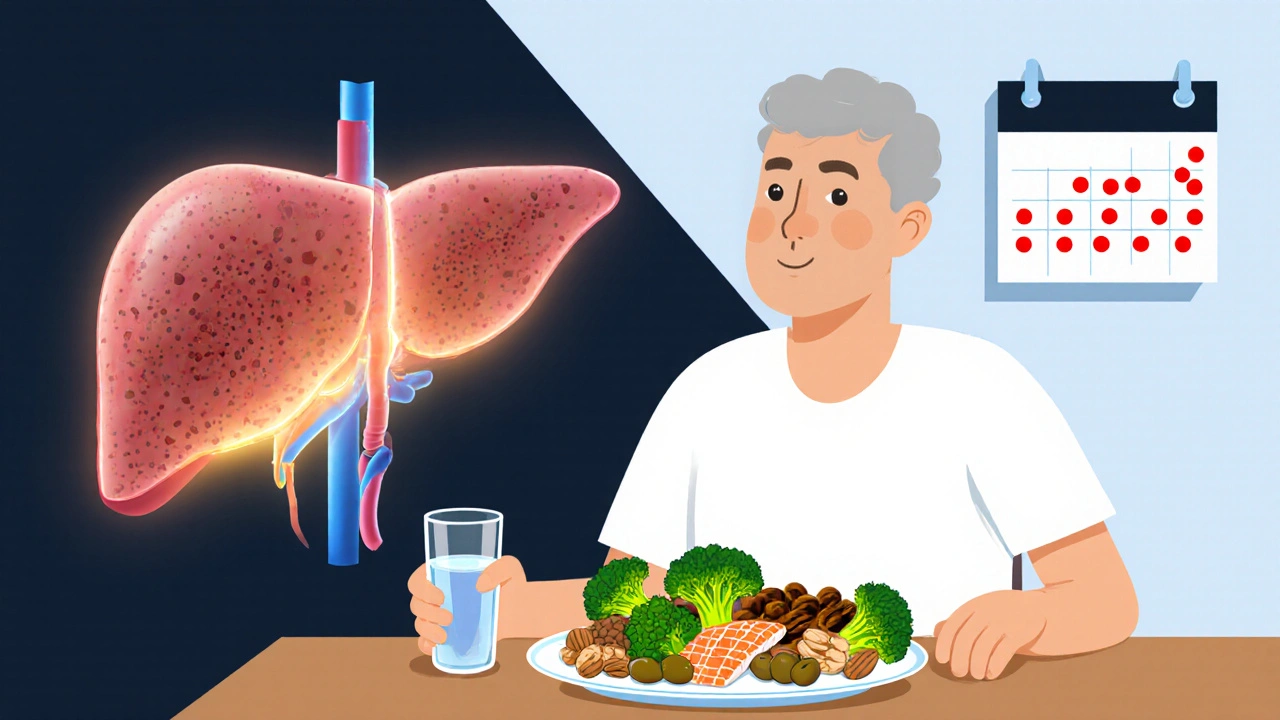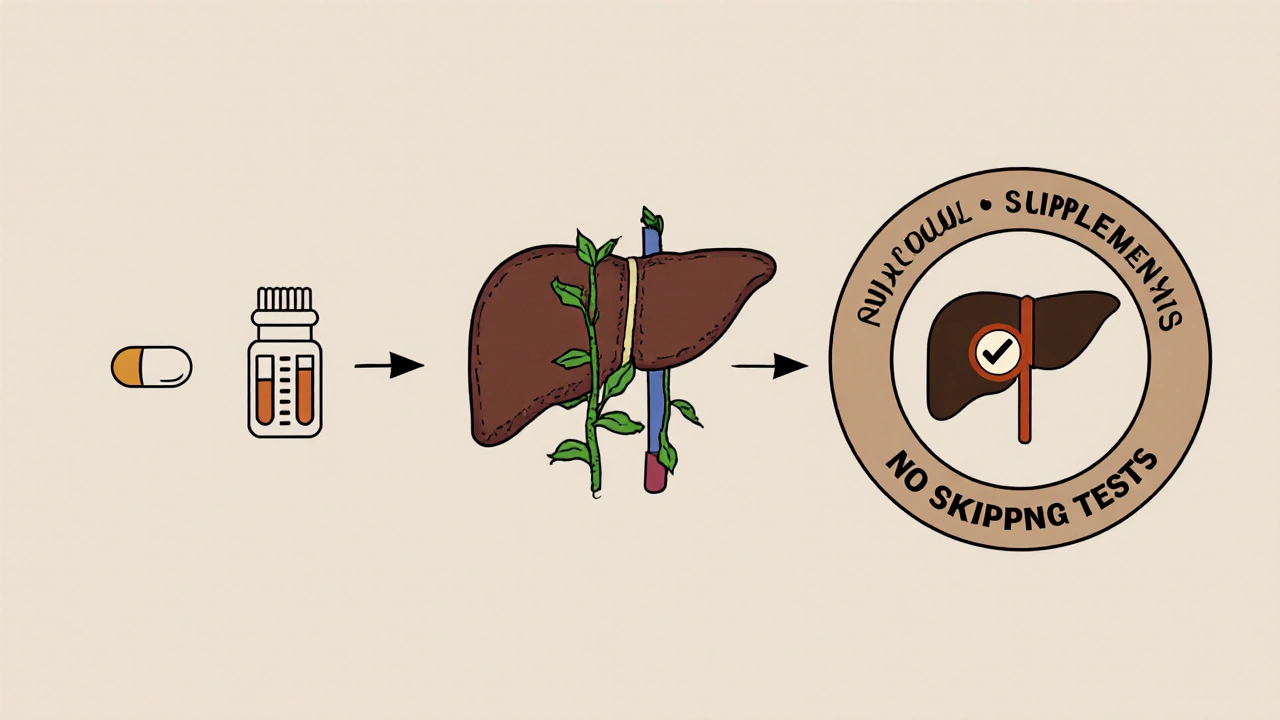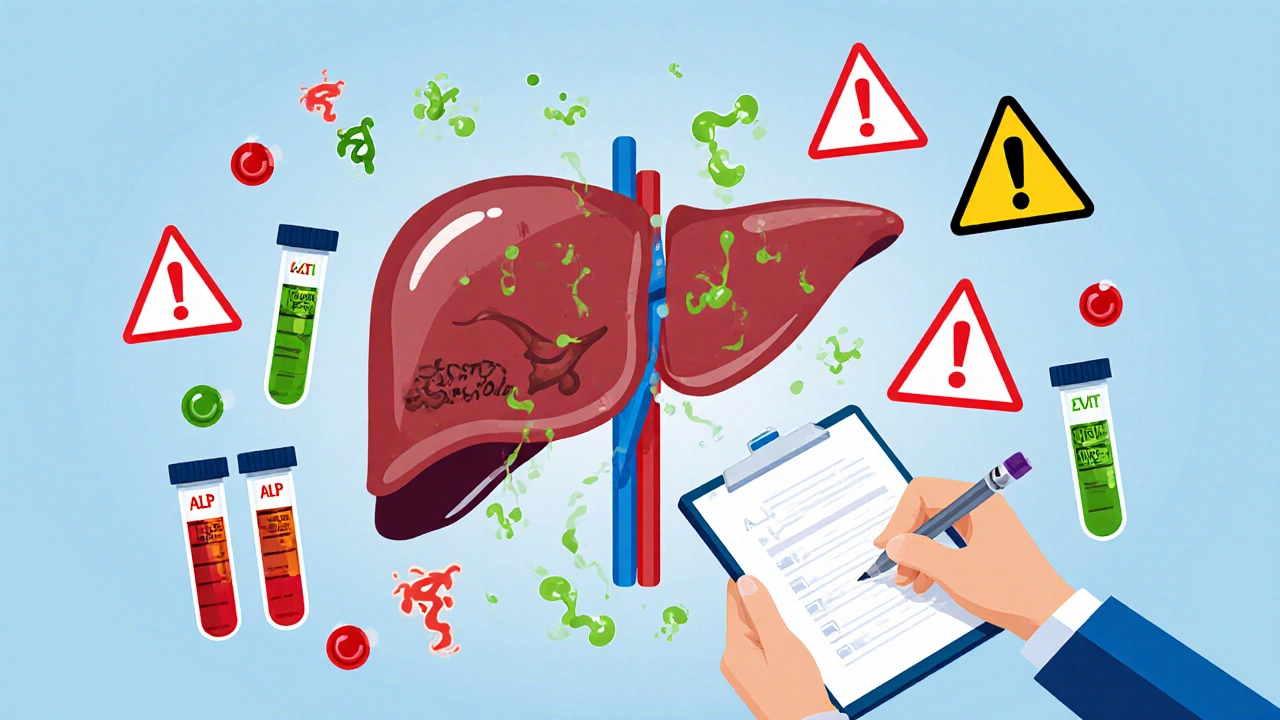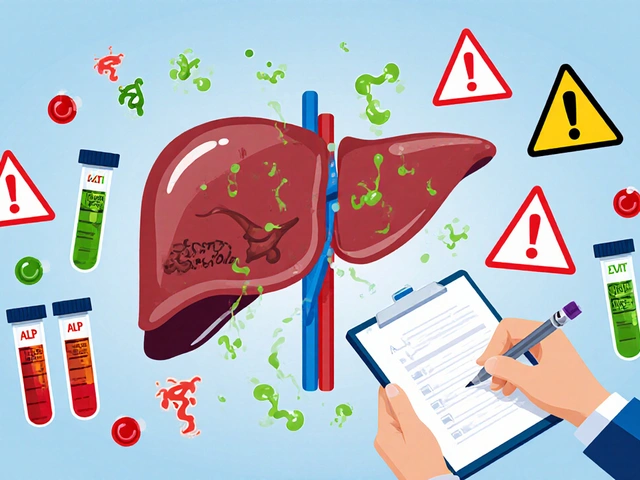When you're prescribed acitretin for severe psoriasis or other skin conditions, your doctor isn't just thinking about your skin. They're also watching your liver - closely. Acitretin is a powerful medication, and while it can clear up stubborn plaques and scaling, it puts stress on your liver. Many people don’t realize how serious this risk is until their blood tests show abnormal results. The good news? With the right monitoring, you can use acitretin safely and avoid long-term damage.
Why Acitretin Affects Your Liver
Acitretin is a retinoid, a synthetic version of vitamin A. Your body breaks it down in the liver, where enzymes process it into metabolites that help regulate skin cell growth. But high doses and long-term use can overwhelm this system. The liver doesn’t just metabolize acitretin - it stores it too. Over time, this buildup can cause inflammation, fatty deposits, or even scarring.
Studies from the Journal of the American Academy of Dermatology show that up to 30% of patients on acitretin for more than six months develop elevated liver enzymes. That doesn’t always mean damage - but it’s a red flag. If ignored, it can lead to hepatitis, fibrosis, or worse. The risk goes up if you drink alcohol, have existing liver disease, or take other medications that affect the liver, like statins or certain antibiotics.
What Liver Tests You Need
Before starting acitretin, your doctor will order a baseline liver panel. This isn’t just one test - it’s a group of blood markers that give a full picture. Here’s what they’re looking for:
- ALT (alanine aminotransferase): The most sensitive marker for liver cell damage. Normal is under 40 U/L.
- AST (aspartate aminotransferase): Also indicates liver stress. Normal is under 35 U/L.
- ALP (alkaline phosphatase): Shows bile duct activity. Elevated levels can mean blockage or inflammation.
- Bilirubin: A waste product from red blood cells. High levels can signal trouble with liver processing.
- Albumin and PT/INR: These measure how well your liver makes proteins and clotting factors - signs of overall liver function.
After starting acitretin, you’ll get tested every 4 to 8 weeks for the first 3 months. If everything stays normal, your doctor may stretch it to every 3 months. But if your ALT or AST jumps more than twice the upper limit of normal, treatment stops immediately - no exceptions.
What Happens If Your Liver Enzymes Rise
A small rise in liver enzymes - say, from 30 to 50 U/L - isn’t always a crisis. It can happen due to dehydration, recent illness, or even intense exercise. But if your levels keep climbing, your doctor won’t wait. They’ll likely pause acitretin and retest in 1-2 weeks. If levels stay high, you’ll need further evaluation: an ultrasound, maybe a FibroScan, or even a liver biopsy in rare cases.
Here’s what most patients don’t know: acitretin’s effects on the liver can be reversible - if caught early. Many people who stop the drug and avoid alcohol see their enzymes return to normal within 2-4 months. But if you keep taking it while enzymes are high, the damage can become permanent. That’s why skipping a blood test isn’t an option.

What You Can Do to Protect Your Liver
You can’t control everything, but you have real power over these habits:
- Avoid alcohol completely. Even one drink a week can increase liver stress. Acitretin and alcohol together raise the risk of severe liver injury. This isn’t a suggestion - it’s a requirement.
- Check all supplements and OTC meds. Herbal products like kava, green tea extract, or high-dose vitamin A can harm your liver. Pain relievers like acetaminophen (Tylenol) are risky above 2,000 mg per day. Always ask your pharmacist or doctor before taking anything new.
- Eat for liver health. Focus on whole foods: vegetables, lean proteins, nuts, and healthy fats. Avoid sugary drinks, fried foods, and processed carbs. A 2023 study in Clinical Nutrition found that patients on acitretin who followed a Mediterranean-style diet had significantly lower ALT levels than those who didn’t.
- Stay hydrated. Water helps your liver flush out toxins. Aim for 2-3 liters a day, especially if you’re active or live in a hot climate.
- Don’t skip appointments. Set calendar reminders for blood tests. If you miss one, call your doctor right away. Delayed monitoring is the #1 reason people end up with liver complications.
Who Should Avoid Acitretin Altogether
Not everyone is a candidate. You should not take acitretin if:
- You have active liver disease (hepatitis, cirrhosis, fatty liver disease)
- Your liver enzymes were already high before starting treatment
- You drink alcohol regularly or have a history of alcohol use disorder
- You’re pregnant or planning to become pregnant - acitretin stays in your body for years and can cause severe birth defects
- You’re taking other liver-toxic drugs like methotrexate or isotretinoin
If you have a history of liver issues, your doctor might choose a different treatment - like phototherapy, biologics, or topical therapies. Acitretin isn’t the only option, and safety should always come first.

Long-Term Liver Monitoring After Stopping Acitretin
Even after you stop acitretin, your liver isn’t off the hook. The drug can linger in your fat tissue for months - sometimes over a year. That’s why you still need liver tests every 3 months for at least 2 years after your last dose. Some doctors recommend testing for up to 3 years, especially if you had elevated enzymes during treatment.
Why so long? Because liver damage from acitretin can develop slowly. A 2022 case report in British Journal of Dermatology described a patient who developed cirrhosis 18 months after stopping acitretin - with no symptoms until then. Regular monitoring is the only way to catch this early.
What to Do If You’ve Already Had Liver Damage
If you’ve had confirmed liver injury from acitretin, you’ll need ongoing care. Your doctor may refer you to a hepatologist - a liver specialist. You’ll likely need:
- Regular ultrasounds to check for scarring or tumors
- Tests for liver fibrosis (like FibroScan or ELF test)
- Guidance on diet, exercise, and avoiding alcohol for life
Recovery is possible, but it takes time. Many patients improve significantly within a year of stopping the drug and making lifestyle changes. But some may need lifelong monitoring. There’s no second chance with liver damage.
Can I drink alcohol while taking acitretin?
No. Drinking alcohol while taking acitretin significantly increases your risk of serious liver injury. Even small amounts can be dangerous. Doctors require complete abstinence during treatment and for at least 2 years after stopping the drug. This is non-negotiable.
How often should I get blood tests while on acitretin?
You’ll need blood tests every 4 to 8 weeks for the first 3 months. If your liver enzymes stay normal, your doctor may extend testing to every 3 months. But if levels rise, testing will return to every 2-4 weeks until the issue is resolved. Never skip a test - it’s your safety net.
What if my liver enzymes go up but I feel fine?
Feeling fine doesn’t mean your liver is fine. Liver damage often has no symptoms until it’s advanced. Elevated enzymes are the earliest warning sign. If your levels rise above twice the normal limit, your doctor will stop acitretin immediately - even if you have no pain, fatigue, or jaundice. Early action prevents permanent harm.
Can I take vitamin A supplements while on acitretin?
No. Acitretin is a synthetic form of vitamin A. Taking extra vitamin A - whether from pills, cod liver oil, or multivitamins - can lead to toxic levels and increase liver damage risk. Always check labels and avoid any supplement containing preformed vitamin A.
Is liver damage from acitretin permanent?
It can be, but it doesn’t have to be. If caught early and you stop the drug, most liver enzyme elevations reverse within a few months. However, if treatment continues despite high enzymes, scarring (fibrosis) can develop and become irreversible. Long-term damage may lead to cirrhosis or liver failure. Monitoring is your best protection.
Final Thought: Your Liver Can’t Speak - So You Have To
Acitretin can change your life by clearing your skin. But your liver doesn’t have a voice. It can’t tell you when it’s in trouble. That’s why your blood tests, your diet, your choices about alcohol - they’re not optional. They’re the only way your liver can survive this treatment. Stick to the schedule. Say no to risky supplements. Eat clean. Stay hydrated. And never, ever skip a test. Your skin might be the reason you started this treatment - but your liver is what keeps you alive.



Comments
I took acitretin for 14 months and my ALT spiked to 120. They paused it, I went cold turkey on alcohol (even one beer felt like betrayal), and 3 months later I was back to 32. Don't sleep on these labs. Your liver doesn't care how much you love your skin.
I find it astonishing that anyone would consider this treatment without first undergoing a comprehensive hepatic metabolic profile, complete with elastography and a 24-hour urinary bile acid quantification. The casualness with which patients treat this medication is frankly negligent.
So... no alcohol. No supplements. No Tylenol. No pizza. No life. Got it. Thanks for the 12-page pamphlet on how to be a ghost while your skin clears up.
I got acitretin and my liver was fine but i stopped drinking and now i dont even like beer anymore honestly its not that hard just dont be a dumbass
I appreciate the clarity here. My cousin was on this and they didn't monitor him right. He ended up with fatty liver. It's not just about the drug-it's about listening. I'm glad someone laid it out like this.
why do we let big pharma tell us what to do like were kids? i mean come on we got internet now you can google liver herbs and shit why do we need some doc telling us no alcohol? america is so weak
This is actually super helpful. I'm on it now and I've been setting phone alarms for my bloodwork. One thing I’ll add-hydration matters more than people think. I started drinking a liter of water before bed and my enzymes dipped a little faster. Small wins.
I DID IT. I stayed off alcohol for 2 years. I swapped my soda for sparkling water with lemon. I started eating kale like it was my job. And guess what? My skin is CLEAR and my liver is FINE. You can do this. You are stronger than the cravings. 🌱💪 #AcitretinWarrior
Wait... so... you’re saying I can’t have my nightly glass of wine? Or my turmeric latte? Or my protein shake with vitamin A? And I have to get blood drawn every 4 weeks? For TWO YEARS? ...I think I’ll just live with the plaques.
In India we use neem and amla for liver. Why western doctors ignore this? Acitretin is poison. Ayurveda heal better. No blood test needed. Just drink juice.
I just want to say... your liver is your silent hero. It doesn't complain, it doesn't post on Instagram, it just keeps going. So when it whispers through your ALT levels? Listen. Not because you're scared. But because you're grateful. ❤️
You got this. I know it feels like your whole life is on hold. But this isn't forever. Every blood test is a step toward freedom. And when it's over? You'll look back and be proud you chose your health over convenience.
The author clearly has no grasp of the epistemological implications of hepatic pharmacokinetics. One must question the ontological security of relying on ALT as a proxy for parenchymal integrity-especially when considering non-alcoholic steatohepatitis comorbidity thresholds.